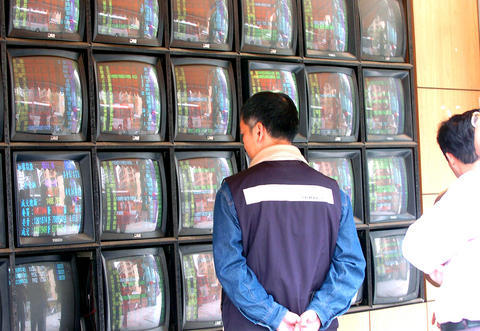Shares climbed 2.25 percent yesterday, the last trading session before the presidential election, driven primarily by expectations that cross-strait relations will improve after the election, analysts said.
A strong rebound on Wall Street overnight also contributed to the climb, they said.
The benchmark TAIEX rose 187.37 points to 8,524.99. Turnover was NT$171.362 billion (US$5.6 billion) yesterday, up from NT$145.699 billion the previous day, Taiwan Stock Exchange tallies showed.

PHOTO: CHANG CHIA-MING, TAIPEI TIMES
"Investors were betting on a win by the pan-blue camp in the election and the ruling party has also helped lift stocks, as it did not want to look bad before the election," Dave Chou (
Foreign fund managers led the three major institutional investors with net purchases of NT$25.25 billion in local stocks yesterday -- the highest one-day net purchase so far this year -- after they sold a net NT$45.46 billion in the week to Thursday.
Domestic investors -- including investment trust firms and proprietary traders -- also bought a net NT$6.5 billion in local stocks. For this week, they have spent a net NT$12.04 billion on local equities, the stock exchange' data showed.
"Banking and electronics led the election-eve share rally," Chou said, adding that the banking shares saw a transaction surge over the previous day partly because investors expected local banks would expand their businesses to China regardless of the election outcome.
Banking shares rose 2.63 percent on average yesterday. Trading of bank stocks increased in volume, accounting for 24 percent of the main bourse's total trading yesterday, compared with 21 percent on Thursday, the stock exchange's data showed.
Electronics shares climbed 2.49 percent on average, but the sector's trading accounted for 43.3 percent of total market turnover yesterday, which was a setback compared with its recent level of 50 percent, Chou said.
"It showed investors were not very convinced about this sector's future performance," he said. "People still have to consider the sector's fundamentals and risks, such as first-quarter earnings and forex losses as the market opens next week."
Taiwan stocks yesterday outperformed those of major regional markets. Japanese share prices closed up 1.81 percent, South Korean stocks ended 1.4 percent higher and the Shanghai bourse was down 0.20 percent.
But Alan Tseng (
Tseng declined to predict the impact of election results on share segments during the post-election period. He did say, however, that he was cautious about the surge of foreign investors' net purchases, saying it was not always an indication that the market would stay strong over the following sessions.
The stock exchange's tallies showed that foreign fund managers bought a net NT$21.32 billion in local shares on Feb. 27, but it was immediately followed by a net sale of NT$18.88 billion by foreign fund managers on Feb. 29 and March 3.
When foreign investors came back to buy a net NT$18.49 billion on March 6, they quickly sold off a net NT$33.55 billion between March 7 and March 11.
When foreign investors made net purchases of NT$13.09 billion on March 12, they then dumped a net NT$75.75 billion between March 13 and March 18, the stock exchange's data showed.
Tseng urged investors to be realistic about the listed companies' fundamental development instead of making decisions based on the actions of foreign investors or the election.
"Market turnover is expected to return to the normal level next week and profit-taking pressure is likely to take place during the post-election sessions," Tseng said by phone.

Intel Corp chief executive officer Lip-Bu Tan (陳立武) is expected to meet with Taiwanese suppliers next month in conjunction with the opening of the Computex Taipei trade show, supply chain sources said on Monday. The visit, the first for Tan to Taiwan since assuming his new post last month, would be aimed at enhancing Intel’s ties with suppliers in Taiwan as he attempts to help turn around the struggling US chipmaker, the sources said. Tan is to hold a banquet to celebrate Intel’s 40-year presence in Taiwan before Computex opens on May 20 and invite dozens of Taiwanese suppliers to exchange views

Application-specific integrated circuit designer Faraday Technology Corp (智原) yesterday said that although revenue this quarter would decline 30 percent from last quarter, it retained its full-year forecast of revenue growth of 100 percent. The company attributed the quarterly drop to a slowdown in customers’ production of chips using Faraday’s advanced packaging technology. The company is still confident about its revenue growth this year, given its strong “design-win” — or the projects it won to help customers design their chips, Faraday president Steve Wang (王國雍) told an online earnings conference. “The design-win this year is better than we expected. We believe we will win

Chizuko Kimura has become the first female sushi chef in the world to win a Michelin star, fulfilling a promise she made to her dying husband to continue his legacy. The 54-year-old Japanese chef regained the Michelin star her late husband, Shunei Kimura, won three years ago for their Sushi Shunei restaurant in Paris. For Shunei Kimura, the star was a dream come true. However, the joy was short-lived. He died from cancer just three months later in June 2022. He was 65. The following year, the restaurant in the heart of Montmartre lost its star rating. Chizuko Kimura insisted that the new star is still down

While China’s leaders use their economic and political might to fight US President Donald Trump’s trade war “to the end,” its army of social media soldiers are embarking on a more humorous campaign online. Trump’s tariff blitz has seen Washington and Beijing impose eye-watering duties on imports from the other, fanning a standoff between the economic superpowers that has sparked global recession fears and sent markets into a tailspin. Trump says his policy is a response to years of being “ripped off” by other countries and aims to bring manufacturing to the US, forcing companies to employ US workers. However, China’s online warriors